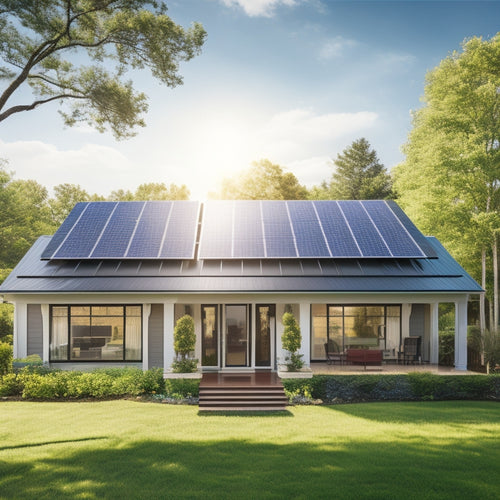
Benefits of Home Energy Systems
Share
Home energy systems deliver numerous benefits that help you save money and reduce your environmental impact. By lowering your utility bills through energy-efficient technologies, you can enjoy significant savings each month. Additionally, these systems rely on renewable energy sources, cutting your carbon footprint and promoting sustainability. With the right choices, like solar panels or geothermal solutions, you'll also enhance your property's value, making it more appealing in the real estate market. Investing wisely in these systems can lead to substantial long-term returns. If you want to investigate how to maximize these advantages, there's more to uncover.
At a Glance
- Home energy systems significantly reduce utility bills through energy-efficient technologies and renewable energy sources.
- Incentives and rebates lower initial costs, making energy systems more affordable for homeowners.
- Utilizing renewable energy reduces the carbon footprint, supporting environmental sustainability.
- High-efficiency systems enhance energy management, leading to long-term savings and increased property value.
- Investing in home energy systems promotes energy independence and resilience against market fluctuations.
Cost-Effective Energy Savings
When you invest in home energy systems, you'll likely see a significant drop in your utility bills, putting more money back in your pocket.
By performing an energy needs assessment to determine the ideal system size for your home, you can reduce grid reliance and further lower your energy costs.
Many programs also offer incentives and rebates that make these upgrades even more affordable, enhancing your savings further.
Reduced Utility Bills
Implementing a home energy system can lead to significant reductions in your utility bills, making it a smart investment for any homeowner. By utilizing various energy conservation techniques, you can optimize your energy consumption and minimize waste. For instance, smart thermostats adjust heating and cooling based on your schedule, ensuring you're not overpaying when you're not home.
Moreover, utilizing renewable energy sources, like solar panels, can drastically lower your reliance on traditional power grids, further slashing your monthly expenses. As you take control of your energy use, you'll enjoy the freedom that comes with reduced bills, allowing you to allocate resources to other pursuits that matter to you.
The home automation benefits extend beyond convenience; they directly contribute to cost savings. Automated systems can monitor energy usage in real time, alerting you to spikes that may indicate inefficiencies.
This proactive approach enables you to make informed decisions about your energy consumption, reinforcing your commitment to both sustainability and financial prudence. Ultimately, investing in a home energy system isn't just about reducing bills—it's about embracing a lifestyle of freedom and responsibility.
Incentives and Rebates
Incentives and rebates can greatly improve the cost-effectiveness of investing in home energy systems. By taking advantage of federal incentives and local rebates, you can considerably reduce your initial investment. Tax credits often allow you to deduct a percentage of installation costs from your federal tax return, enhancing your savings even further.
Additionally, many utility companies offer financing options and installation discounts through partnerships with energy efficiency programs. Participating in community initiatives can also lead to grant programs that fund energy-efficient upgrades.
Before diving in, consider scheduling energy audits to determine what systems would be most beneficial for your home. This step guarantees you meet program eligibility requirements, maximizing your potential savings.
Don't overlook the importance of staying informed about the latest incentives available in your area. The environment of rebates and credits is always changing, and being proactive can help you secure the best financing options.
Ultimately, by leveraging these incentives, you can't only enjoy lower energy costs but also contribute to a more sustainable future, gaining the freedom that comes with energy efficiency. Seize these opportunities, and make your home a symbol of energy savings.
Environmental Impact Reduction
When you invest in home energy systems, you're taking a significant step toward lowering your carbon footprint.
By utilizing sustainable energy sources like solar or wind, you not only reduce your reliance on fossil fuels but also contribute to a healthier planet.
These systems can lead to significant energy savings, potentially eliminating bills and promoting environmental health through financial benefits of solar power.
This choice not only benefits you financially but also promotes environmental stewardship for future generations.
Lower Carbon Footprint
As society increasingly focuses on sustainability, adopting home energy systems can greatly lower your carbon footprint. By integrating renewable technologies, like solar panels or wind turbines, you can markedly reduce your reliance on fossil fuels. This shift not only benefits the environment but also aligns with eco-friendly practices that you might already be considering.
Implementing carbon offset strategies is another vital component of achieving a lower carbon footprint. When you generate your own energy, you minimize greenhouse gas emissions, directly contributing to a healthier planet.
Furthermore, many home energy systems enable you to sell excess energy back to the grid, promoting a cycle of sustainability that enhances your economic situation.
You'll find that adopting these systems isn't just an investment in your home; it's a commitment to future generations. By embracing renewable energy, you're taking a stand for freedom—freedom from rising utility costs, dependence on non-renewable resources, and contributing to climate change.
Ultimately, the choice to lower your carbon footprint through home energy systems is a declaration of your values and aspirations for a cleaner, sustainable future. Take the leap, and make a difference today.
Sustainable Energy Sources
Sustainable energy sources play an essential role in reducing environmental impact and promoting a healthier planet. By embracing options like solar energy and wind energy, you can greatly lower your carbon footprint while enjoying the benefits of energy independence. Geothermal heating and bioenergy solutions provide reliable alternatives that contribute to a cleaner environment.
| Energy Source | Benefits |
|---|---|
| Solar Energy | Reduces electricity costs |
| Wind Energy | Minimal land disruption |
| Geothermal Heating | Efficient and sustainable |
| Bioenergy Solutions | employs waste materials |
Moreover, hydropower benefits are significant, offering a renewable source that can power your home. With advancements in energy storage and smart grids, you can maximize these resources effectively. Community solar projects allow you to invest in local energy solutions, nurturing a sense of connection and shared responsibility.
Hybrid systems, combining multiple energy sources, guarantee reliability and sustainability. By adopting these sustainable energy systems, you don't just contribute to environmental conservation; you also gain the freedom to control your energy consumption. Ultimately, embracing these technologies leads to a healthier planet and a more independent lifestyle.
System Efficiency Ratings
When you look at home energy systems, understanding efficiency ratings is essential for making informed choices.
These ratings directly influence your energy bills, helping you identify systems that can save you money while reducing your environmental impact.
For instance, solar power systems, which have seen significant advancements in efficiency and technology, can substantially lower your carbon footprint and provide long-term savings cost-effective solution.
Understanding Efficiency Ratings
Understanding efficiency ratings is essential for anyone considering home energy systems. These ratings reflect the energy performance of your system and help you gauge how effectively it converts energy into usable power. By familiarizing yourself with these ratings, you can make informed decisions that align with your desire for autonomy and sustainability.
Efficiency benchmarks serve as a standard to compare different systems. They indicate how much energy is wasted during operation, and a higher rating means better performance. For instance, systems with Energy Star certification typically meet stringent efficiency standards, ensuring you get the most from your investment.
When evaluating options, consider both the short-term and long-term implications of efficiency ratings. A system with a high efficiency rating might've a higher upfront cost, but it can lead to significant savings and improved energy independence over time.
In essence, understanding these ratings enables you to choose a home energy system that not only meets your specific needs but also contributes to a sustainable future.
Impact on Energy Bills
The efficiency ratings of your home energy system have a direct impact on your energy bills. By investing in high-rated systems, you can greatly reduce your energy consumption and lower your monthly costs.
Advanced energy management tools, like smart thermostats and home automation, allow you to optimize your energy use, especially during peak demand times. This not only saves you money but also improves your grid independence.
Conducting regular energy audits helps you identify areas where you can enhance efficiency. Implementing strategies like load balancing and energy monitoring guarantees that your home runs smoothly without unnecessary energy waste.
Utility programs may offer incentives for using high-efficiency systems, further decreasing your expenses.
Moreover, when you actively manage your energy consumption, you enable yourself to make choices that benefit both your wallet and the environment.
You'll feel a sense of freedom knowing that you're less reliant on fluctuating energy prices and external energy sources.
Accept the opportunity to create a sustainable and cost-effective energy solution for your home, and watch your energy bills decrease as you take charge of your energy future.
Selecting Based on Energy Source
When choosing a home energy system, it's essential to weigh your options between renewable energy sources and conventional ones.
Renewable systems, like solar or wind, can greatly lower your carbon footprint while providing long-term savings. For instance, solar energy systems not only reduce reliance on traditional energy sources but also enhance energy efficiency by up to 20%, allowing homeowners to benefit from long-term savings.
On the other hand, conventional energy sources may offer reliability and immediate availability, but they often come with higher ongoing costs and environmental concerns.
Renewable Energy Options
As you examine renewable energy options for your home, it's crucial to contemplate which energy sources align best with your needs and environment.
Solar panels are a popular choice, capturing sunlight to generate electricity for your daily use. They offer great potential for energy independence, especially in sunny regions.
Wind turbines, on the other hand, can be effective in areas with consistent wind patterns, providing another avenue for sustainable energy.
Consider integrating energy storage solutions to maximize efficiency. These systems allow you to store excess energy generated during peak production times, ensuring a consistent supply when demand increases.
Grid integration can also enhance your setup, allowing you to sell surplus energy back to the grid.
Hybrid systems combine various technologies, like solar panels and wind turbines, to optimize energy generation.
If you're seeking complete autonomy, off-grid solutions utilizing microgeneration technologies can enable you to break free from traditional energy sources entirely.
Ultimately, selecting the right renewable energy options not only elevates your home's sustainability but also offers you greater control over your energy future.
Accept the freedom that comes with energy independence; it's a wise investment in both your home and the planet.
Conventional Energy Sources
Conventional energy sources, such as natural gas, coal, and nuclear power, play a significant role in today's energy environment. While fossil fuels dominate the domain, providing a reliable and established means of energy generation, they also raise important questions about sustainability and energy security.
You might appreciate the stability that conventional sources offer, especially when it comes to meeting immediate energy demands. These energy sources have been the backbone of economies for decades, ensuring that homes remain powered and industries run smoothly.
However, reliance on fossil fuels can create vulnerabilities, as geopolitical tensions and market fluctuations often threaten energy security.
It's vital to weigh the benefits of conventional energy against the growing need for alternative solutions. Shifting to home energy systems that incorporate renewable options can enhance your energy independence, reducing reliance on fossil fuels and improving sustainability.
Long-Term Investment Returns
Investing in home energy systems can greatly increase your property's value over time.
As energy efficiency becomes a priority for buyers, homes equipped with these systems often attract higher offers.
Increased Property Value
Improving your home's energy efficiency can greatly increase its market appeal and long-term value. When considering property market trends, homes equipped with energy systems often command higher prices. Buyers are increasingly looking for properties that not only reduce utility costs but also contribute to a sustainable future.
Here's a snapshot of how energy-efficient systems can impact your property's value:
| Energy System Type | Potential Increase in Value |
|---|---|
| Solar Panels | 4-6% |
| Energy-Efficient Windows | 3-5% |
| Smart Thermostats | 2-4% |
| Geothermal Heating | 5-8% |
| Insulation Upgrades | 3-7% |
Frequently Asked Questions
How Do Home Energy Systems Increase Property Value?
Home energy systems enhance energy efficiency, which increases property appraisal values. By reducing utility costs and appealing to eco-conscious buyers, you'll likely see a significant return on investment, elevating your property's desirability and market worth.
What Maintenance Is Required for Home Energy Systems?
To guarantee system efficiency, you'll need to perform routine checks on your home energy systems. Regular maintenance keeps them running at peak performance, preventing costly repairs and enhancing your freedom to enjoy a sustainable, efficient lifestyle.
Can Home Energy Systems Work During Power Outages?
Yes, home energy systems can work during power outages. With battery backup and renewable sources, you gain energy independence and enhance grid reliability, ensuring your home stays powered even when traditional sources fail.
Are There Tax Incentives for Installing Home Energy Systems?
Imagine you install solar panels and qualify for federal credits and state rebates, considerably reducing installation costs. These incentives, alongside energy savings and positive environmental impact, make various system types appealing for your freedom-focused lifestyle.
How Can I Monitor My Energy Usage Effectively?
To monitor your energy usage effectively, use energy tracking apps that provide usage analytics. These tools help you identify patterns, reduce consumption, and enable you to take control of your energy habits, nurturing greater independence.
Explore More
In choosing a home energy system, you're not just cutting costs; you're laying the foundation for a greener future. Imagine saving money while nurturing the planet—it's a win-win! By evaluating system efficiency and selecting the right energy source, you're investing wisely for years to come. So, why wait? Utilize the power of home energy systems today, and watch as your savings grow and your environmental footprint shrinks. The benefits are clear, and the time to act is now.
Related Posts
-

Top Eco-Friendly Camping Equipment for a Sustainable Adventure
When you're camping with the planet in mind, opt for eco-friendly gear like tents made from recycled materials and bi...
-

Solar Powered Lights for Sustainable Home Decor
Solar-powered lights offer a stylish and eco-friendly way to enhance your home decor. They capture sunlight, converti...
-

Home Solar Installation Cost
You're considering installing solar panels on your home, and the upfront cost is likely the biggest hurdle standing i...


